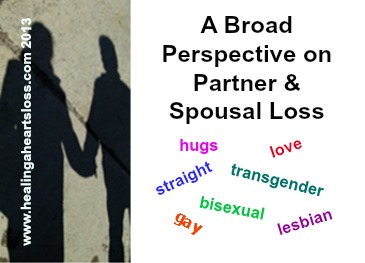As you know world has changed and along with it are the meanings of the words partner and spouse; which can refer to several different situations or relationships.
Grief and loss associated with any aspect of an intimate partnership or relationship have concerns that may differ from person to person and between the sexes.
Who are the people involved in the relationship? Is the relationship sanctioned by others such as society, family, friends etc.? A relationship without the approval of others and the inclusion of closeness with extended family members can create additional difficulties for the surviving partner after a loss.
Concerns such as how you are perceived by society after your loss. Is your loss acknowledged and shared with others who love or have loved your partner? Are you openly able to talk about your grief and loss or do you keep much of how you feel locked inside of you? Why?
When the relationship is accepted by others and closeness exists between family, extended family members, etc. the loss experience can be shared to a greater degree.
The other side of the coin is when knowingly or unknowingly the relationship is not accepted by the family and other loved ones of the deceased.
Surviving partner can refer to relationships with gays, lesbians, transsexuals, straight, bisexuals, spouses from second, third and more relationships, mistresses, and if I missed any add it to the list.
Do you know of situations where the surviving partner was discarded or ignored before, during or after the death loss? I have heard many stories of loss and the associated emotional pain knowingly or in some cases unknowingly caused by others.
Consider the individual who is excluded from family events that in the past they had been welcomed at for decades. What about the younger children who once loved to connect with cousins, aunts, uncles, grandparents and more, but no longer interact for some reason.
Misunderstandings, lack of approval, blame, stubbornness or what ever the reason create barriers to ongoing connections for many individuals. Is there a right or wrong to these situations? Perhaps, both sides are hurting and words were spoken that are hard to take back.
One quote I have heard from several individuals is “I don’t do stupid very well”. Meaning they are unable to handle what other people do that does not seem important at the moment.
Grief has a way of bringing the worst out in some people during that time.
I often say or acknowledge that grieving individuals have very little tolerance for anything in life.
All my best,
Barbara Gillett Saunders
Grief Counsellor/Thanatologist

